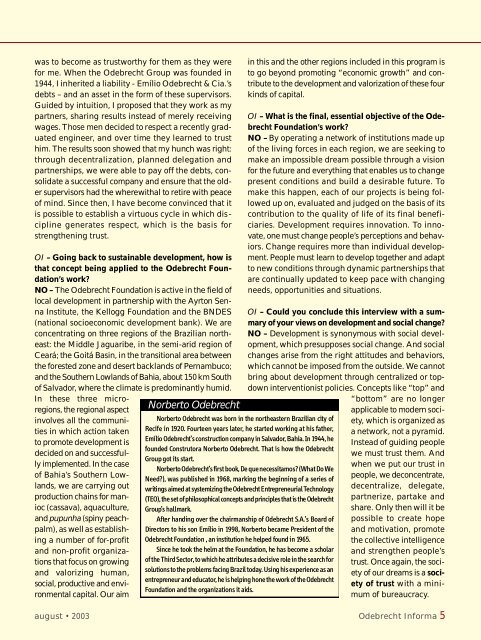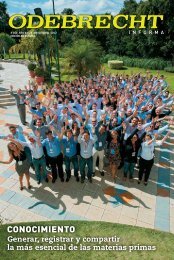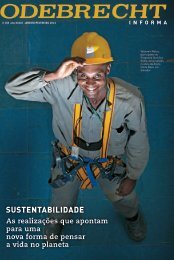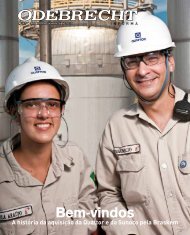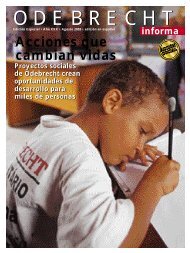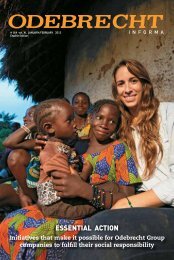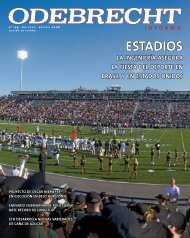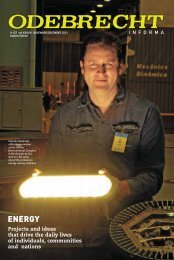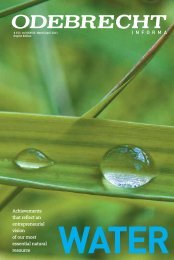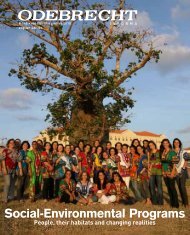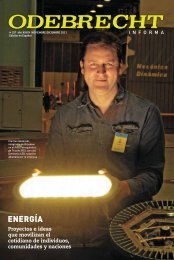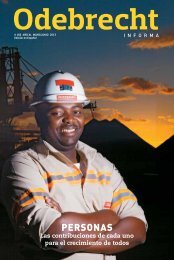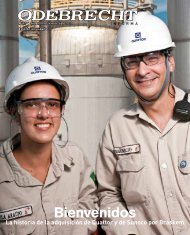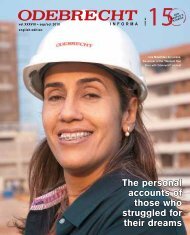O deb re cht 's social p rojects create development oppo rtunities for ...
O deb re cht 's social p rojects create development oppo rtunities for ...
O deb re cht 's social p rojects create development oppo rtunities for ...
Create successful ePaper yourself
Turn your PDF publications into a flip-book with our unique Google optimized e-Paper software.
was to become as trustworthy <strong>for</strong> them as they we<strong>re</strong><br />
<strong>for</strong> me. When the O<strong>deb</strong><strong>re</strong><strong>cht</strong> Group was founded in<br />
1944, I inherited a liability - Emílio O<strong>deb</strong><strong>re</strong><strong>cht</strong> & Cia.’s<br />
<strong>deb</strong>ts – and an asset in the <strong>for</strong>m of these supervisors.<br />
Guided by intuition, I proposed that they work as my<br />
partners, sharing <strong>re</strong>sults instead of me<strong>re</strong>ly <strong>re</strong>ceiving<br />
wages. Those men decided to <strong>re</strong>spect a <strong>re</strong>cently graduated<br />
engineer, and over time they learned to tru s t<br />
him. The <strong>re</strong>sults soon showed that my hunch was right:<br />
t h rough decentralization, planned delegation and<br />
partnerships, we we<strong>re</strong> able to pay off the <strong>deb</strong>ts, consolidate<br />
a successful company and ensu<strong>re</strong> that the older<br />
supervisors had the whe<strong>re</strong>withal to <strong>re</strong> t i <strong>re</strong> with peace<br />
of mind. Since then, I have become convinced that it<br />
is possible to establish a virtuous cycle in which discipline<br />
generates <strong>re</strong>spect, which is the basis <strong>for</strong><br />
st<strong>re</strong>ngthening trust.<br />
O I – Going back to sustainable <strong>development</strong>, how is<br />
that concept being applied to the O<strong>deb</strong><strong>re</strong><strong>cht</strong> Found<br />
a t i o n ’s work?<br />
NO – The O<strong>deb</strong><strong>re</strong><strong>cht</strong> Foundation is active in the field of<br />
local <strong>development</strong> in partnership with the Ay rton Senna<br />
Institute, the Kellogg Foundation and the BNDES<br />
(national socioeconomic <strong>development</strong> bank). We a<strong>re</strong><br />
concentrating on th<strong>re</strong>e <strong>re</strong>gions of the Brazilian nort h-<br />
east: the Middle Jaguaribe, in the semi-arid <strong>re</strong>gion of<br />
Ceará; the Goitá Basin, in the transitional a<strong>re</strong>a between<br />
the fo<strong>re</strong>sted zone and desert backlands of Pern a m b u c o ;<br />
and the Southern Lowlands of Bahia, about 150 km South<br />
of Salvador, whe<strong>re</strong> the climate is p<strong>re</strong>dominantly humid.<br />
In these th<strong>re</strong>e micro -<br />
<strong>re</strong>gions, the <strong>re</strong>gional aspect<br />
involves all the communities<br />
in which action taken<br />
to promote <strong>development</strong> is<br />
decided on and successfully<br />
implemented. In the case<br />
of Bahia’s Southern Lowlands,<br />
we a<strong>re</strong> carrying out<br />
p roduction chains <strong>for</strong> manioc<br />
(cassava), aquacultu<strong>re</strong> ,<br />
and p u p u n h a(spiny peachpalm),<br />
as well as establishing<br />
a number of <strong>for</strong>- p ro f i t<br />
and non-profit org a n i z a-<br />
tions that focus on gro w i n g<br />
and valorizing human,<br />
<strong>social</strong>, productive and environmental<br />
capital. Our aim<br />
N o r b e rto O<strong>deb</strong><strong>re</strong> c h t<br />
N o r berto O<strong>deb</strong><strong>re</strong><strong>cht</strong> was born in the northea s tern Brazilian city of<br />
Rec i fe in 1920. Fo u r teen years late r, he started working at his fa t h e r,<br />
Emílio O<strong>deb</strong><strong>re</strong><strong>cht</strong> ’s co n s t ruction co m pany in Salva d o r, Bahia. In 1944, he<br />
founded Co n s t ru t o ra Norberto O<strong>deb</strong><strong>re</strong><strong>cht</strong>. That is how the O<strong>deb</strong><strong>re</strong><strong>cht</strong><br />
G roup got its start.<br />
N o r berto O<strong>deb</strong><strong>re</strong><strong>cht</strong> ’s first book, De que necessitamos? (What Do We<br />
Need?), was published in 1968, marking the beginning of a series of<br />
writings aimed at sys temizing the O<strong>deb</strong><strong>re</strong><strong>cht</strong> Ent<strong>re</strong> p <strong>re</strong>neurial Tech n o l og y<br />
(TEO), the set of philosophical co n cepts and principles that is the O<strong>deb</strong><strong>re</strong><strong>cht</strong><br />
G ro u p’s hallmark.<br />
A f ter handing over the chairmanship of O<strong>deb</strong><strong>re</strong><strong>cht</strong> S.A.’s Board of<br />
D i <strong>re</strong>ctors to his son Emílio in 1998, Norberto became P<strong>re</strong>sident of the<br />
O d e b <strong>re</strong><strong>cht</strong> Foundation , an institution he hel ped found in 19 6 5 .<br />
S i n ce he took the helm at the Foundation, he has become a sch o l a r<br />
of the Third Sec t o r, to which he attributes a dec i s i ve role in the sea r ch fo r<br />
solutions to the problems facing Brazil tod ay. Using his ex pe r i e n ce as an<br />
e n t <strong>re</strong> p <strong>re</strong>neur and educator, he is helping hone the work of the O<strong>deb</strong><strong>re</strong><strong>cht</strong><br />
Foundation and the organizations it aids.<br />
in this and the other <strong>re</strong>gions included in this program is<br />
to go beyond promoting “economic growth” and contribute<br />
to the <strong>development</strong> and valorization of these four<br />
kinds of capital.<br />
O I – What is the final, essential objective of the O<strong>deb</strong><br />
<strong>re</strong><strong>cht</strong> Foundation’s work?<br />
NO – By operating a network of institutions made up<br />
of the living <strong>for</strong>ces in each <strong>re</strong>gion, we a<strong>re</strong> seeking to<br />
make an impossible d<strong>re</strong>am possible through a vision<br />
<strong>for</strong> the futu<strong>re</strong> and everything that enables us to change<br />
p <strong>re</strong>sent conditions and build a desirable futu<strong>re</strong>. To<br />
make this happen, each of our p<strong>rojects</strong> is being followed<br />
up on, evaluated and judged on the basis of its<br />
contribution to the quality of life of its final beneficiaries.<br />
Development <strong>re</strong> q u i <strong>re</strong>s innovation. To innovate,<br />
one must change people’s perceptions and behaviors.<br />
Change <strong>re</strong>qui<strong>re</strong>s mo<strong>re</strong> than individual <strong>development</strong>.<br />
People must learn to develop together and adapt<br />
to new conditions through dynamic partnerships that<br />
a<strong>re</strong> continually updated to keep pace with changing<br />
needs, <strong>oppo</strong><strong>rtunities</strong> and situations.<br />
O I – Could you conclude this interview with a summ<br />
a ry of your views on <strong>development</strong> and <strong>social</strong> change?<br />
NO – Development is synonymous with <strong>social</strong> <strong>development</strong>,<br />
which p<strong>re</strong>supposes <strong>social</strong> change. And <strong>social</strong><br />
changes arise from the right attitudes and behaviors,<br />
which cannot be imposed from the outside. We cannot<br />
bring about <strong>development</strong> through centralized or topdown<br />
interventionist policies. Concepts like “top” and<br />
“bottom” a<strong>re</strong> no longer<br />
applicable to modern socie<br />
t y, which is organized as<br />
a network, not a pyramid.<br />
Instead of guiding people<br />
we must trust them. And<br />
when we put our trust in<br />
people, we deconcentrate,<br />
decentralize, delegate,<br />
p a rtnerize, partake and<br />
s h a <strong>re</strong>. Only then will it be<br />
possible to c<strong>re</strong>ate hope<br />
and motivation, pro m o t e<br />
the collective intelligence<br />
and st<strong>re</strong>ngthen people’s<br />
t rust. Once again, the society<br />
of our d<strong>re</strong>ams is a s o c i-<br />
ety of tru s t with a minimum<br />
of bu<strong>re</strong> a u c r a c y.<br />
august • 2003<br />
O<strong>deb</strong><strong>re</strong><strong>cht</strong> In<strong>for</strong>ma 5


